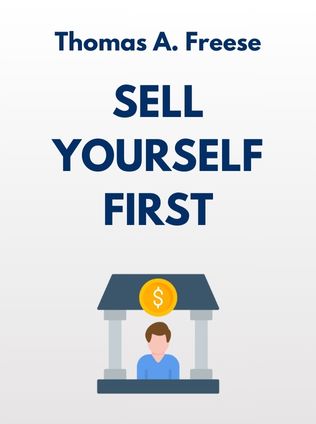
Sell Yourself First
The Most Critical Element in Every Sales Effort
By Thomas A. Freese
Published 12/2010
About the Author
Thomas A. Freese is a renowned expert in sales effectiveness, buyer motivation, and competitive positioning strategies. He is the founder and president of QBS Research Inc., a company dedicated to improving sales performance through innovative methodologies. Freese has authored several influential books on sales, including "Secrets of Question Based Selling," and has been a prominent figure in the sales industry for over two decades. His work focuses on equipping sales professionals with the tools and strategies needed to excel in a highly competitive marketplace. Through his books and training programs, Freese has helped thousands of salespeople worldwide enhance their skills and increase their sales effectiveness.
Main Idea
"Sell Yourself First: The Most Critical Element in Every Sales Effort" by Thomas A. Freese emphasizes the crucial role of the salesperson's personal attributes in achieving sales success. In a market crowded with similar products and services, Freese argues that the most significant differentiator is not the product itself but the salesperson's ability to build trust and credibility with potential buyers. The book explores how sales professionals can leverage their personal qualities—such as competence, confidence, integrity, and creativity—to establish a strong value proposition and differentiate themselves from the competition. Freese provides practical strategies for developing these attributes and using them to create meaningful connections with customers, ultimately leading to increased sales and long-term success.
Table of Contents
- Introduction: The Game Has Changed
- The Elephant in the Room
- Learning How to Win When It's Close
- Your Next Job Interview
- Customers Won't Trust Just Anyone
- Managing Conversational Dynamics
- Establishing the Customer's Buying Criteria
- How to Be More Strategic with Your Sales Questions
- Cost-Justifying Your Intangible Value Proposition
- Making Prospects More Receptive to Your Message
- Positioning Your Solutions Against the Competition
- Wrapping Up the Sale
Introduction: The Game Has Changed
In the introduction, Freese sets the stage by explaining how the sales landscape has evolved. He notes that traditional sales methods, which relied heavily on product features and benefits, are no longer sufficient in an increasingly competitive market. Today, customers are more skeptical and better informed, making it essential for salespeople to differentiate themselves by building trust and establishing credibility early in the sales process.
"In today's competitive landscape, your long-term career aspirations, along with your day-to-day livelihood, depend on your own personal effectiveness more than ever." — Thomas A. Freese
Freese argues that the key to standing out in this environment is to sell yourself first. This means demonstrating qualities such as knowledge, professionalism, and a genuine commitment to the customer's success. By focusing on these intangible attributes, salespeople can create a strong first impression and lay the foundation for a successful sales relationship.
- A financial advisor who builds rapport with clients by demonstrating a thorough understanding of their financial goals and concerns, thus earning their trust and business.
- A technology consultant who positions themselves as an expert by staying up-to-date with industry trends and offering insightful advice during client meetings.
The Elephant in the Room
Freese addresses the issue of customer skepticism, describing it as "the elephant in the room" that all salespeople must acknowledge and address. He explains that customers today are wary of traditional sales pitches and are often skeptical of salespeople's intentions. To overcome this skepticism, Freese emphasizes the importance of transparency and authenticity in all interactions with customers.
"Even if you have a great story to tell about your products and services, customers are skeptical of sales pitches. Thus, for the sake of maximizing your credibility and differentiating your company's value, you must be willing to give customers what they really want—the rest of the story." — Thomas A. Freese
Freese advises salespeople to be upfront about potential challenges and limitations of their products or services, rather than glossing over them. This honesty not only builds trust but also shows that the salesperson has the customer's best interests at heart. By addressing customer concerns directly and providing clear, honest answers, salespeople can differentiate themselves from competitors and establish a stronger, more trustworthy relationship with their customers.
- A sales representative who acknowledges potential drawbacks of their product but offers practical solutions or alternatives to address these issues.
- A real estate agent who provides a balanced view of the properties they are showing, including any potential issues, thus building trust with their clients.
Learning How to Win When It's Close
This chapter focuses on the strategies salespeople can use to gain a competitive edge in situations where the differences between products are minimal. Freese emphasizes the importance of the salesperson's personal qualities, such as creativity, professionalism, and customer focus. He suggests that these intangible attributes can be the deciding factor in a customer's decision to choose one product over another.
Sign up for FREE and get access to 1,400+ books summaries.
You May Also Like
The Subtle Art of Not Giving a F*ck
A Counterintuitive Approach to Living a Good Life
By Mark MansonRich Dad Poor Dad
What the Rich Teach Their Kids About Money - That the Poor and Middle Class Do Not!
By Robert T. KiyosakiHow To Win Friends and Influence People
The All-Time Classic Manual Of People Skills
By Dale CarnegieQuiet: The Power of Introverts
The Power of Introverts in a World That Can't Stop Talking
By Susan Cain



















